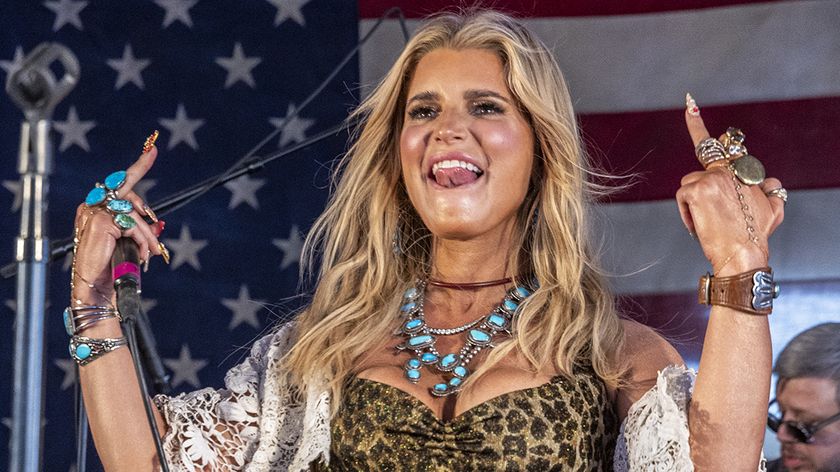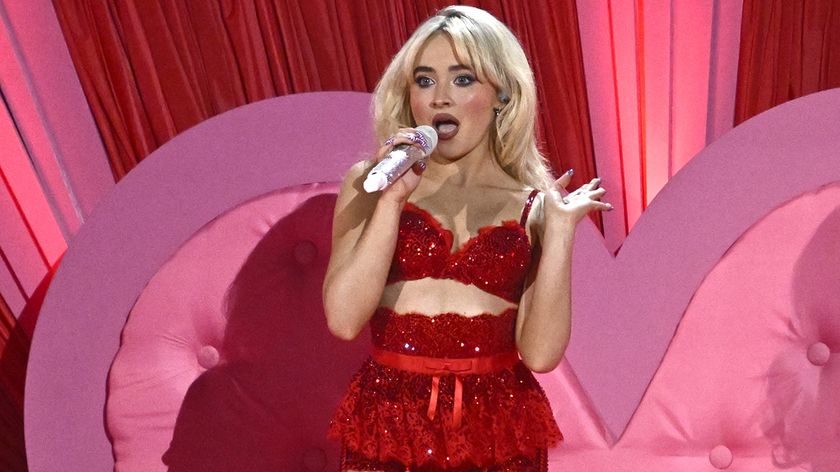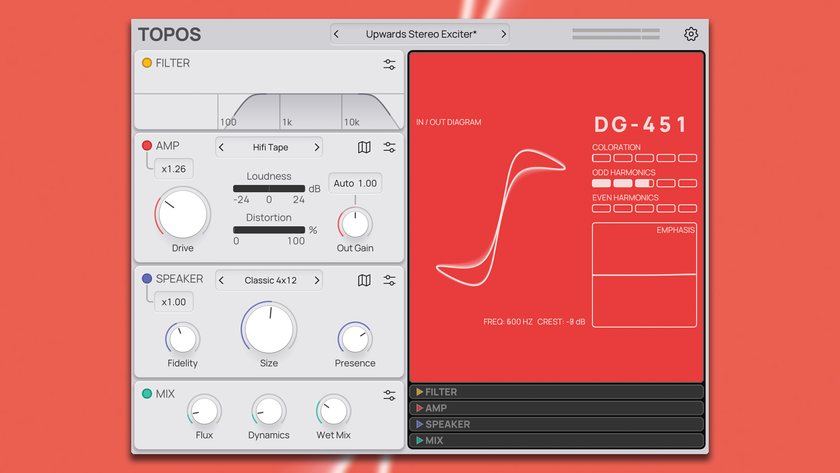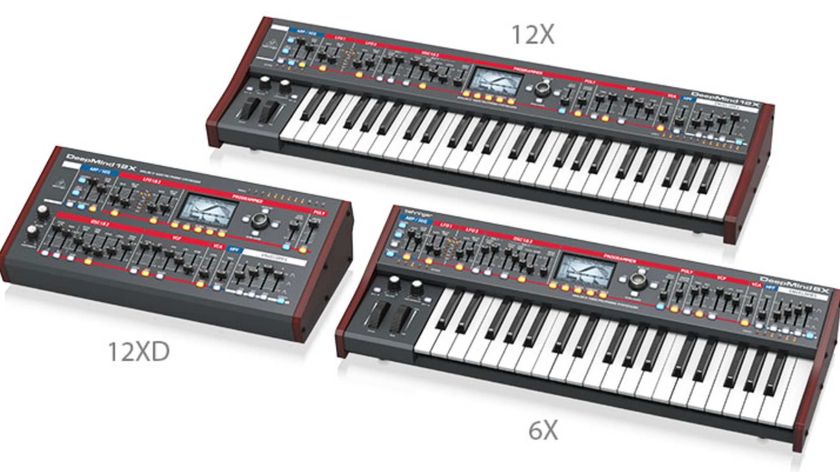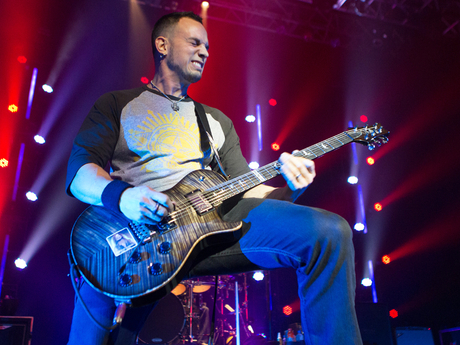
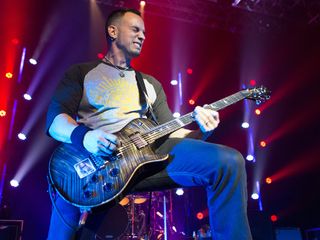
Mark Tremonti cranks the guitars to "gonzo" on his upcoming solo album, All I Was. © Paul A. Hebert ./Retna Ltd./Corbis
Throughout his multi-platinum career with the bands Creed and Alter Bridge, Mark Tremonti has distinguished himself as a crafty songwriter with an ear for big-time radio hooks and a guitarist of astonishing skill and depth.
On the upcoming solo album, All I Was, Tremonti takes center stage as a vocalist. Backed by friends bassist/guitarist Eric Friedman and drummer Garret Whitlock, he storms through 12 pulverizing cuts that combine strong melodies with a decided speed-metal guitar attack.
All I Was streets on 17 July via Fret12 Records. Recently, Tremonti sat down with MusicRadar to talk about going solo, how he felt being the main man at the mic and to answer some questions from MusicRadar readers.
Michael Atkinson asks, Why is your new song so awesome? Mark, we assume he means You Waste Your Time, the first single.
[laughs] "I appreciate that compliment. What can I say? I put everything I had into it, and we did our best to make it express exactly what I wanted it to. I think we're all pretty pleased at the outcome."
Jason 'Synyster' Broadstock wants to know how you manage to practice the guitar so much. He also asks if you have any guitar secrets you can reveal.
Get the MusicRadar Newsletter
Want all the hottest music and gear news, reviews, deals, features and more, direct to your inbox? Sign up here.
"Growing up, I just spent all the time I could playing, working on licks, playing to a metronome, the whole thing. I remember playing all day long until my fingers hurt or my wrists hurt - I was sore all over! As far as secrets or tips, that's really it, though: you've got to work at it, as much as you can, all the time.
"Now that I'm older, I'm starting to shift the way I practice and focus more on improvisation and the bluesier side of guitar playing. It's a different way of looking at the guitar, but I think it'll expand my playing and, ultimately, my music."
Andres Nieto says, You have a PRS signature guitar and signature pedals from Morley and T-Rex. What about a Mark Tremonti signature amp?
"Well, I am an admitted amp fanatic. I've collected probably 50 amplifiers in my life, and I keep on trading them, upgrading them, buying new ones. I'm just not a one-amp man. I would hate to go through the process of designing a signature amp and then finding something else I like better the next week. I'd have to call the amp company and tell them I wasn't going to use it on stage anymore - I can't do that."
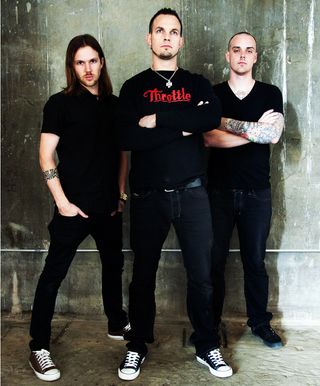
Tremonti flanked by Eric Friedman (left) and Garrett Whitlock.
Kim Holler Durrant asks, How big of a tour are your planning for All I Was?
"We've got our first show booked for here in Orlando on July 17th. I'm waiting for our booking agent to get back to us for all the offers we have for Creed, so I'll just fill in the gaps the rest of the year. I'm hoping to get some good touring in."
Daphne Quigley asks, Which tuning did you use for the majority of the album? Also, what was your primary amplifier?
"Tuning-wise, there's three songs that are a half-step down in drop D. There's about eight songs that are in drop B, and two songs that are in an open E5 tuning dropped down to B, so I guess it'd be an open B5 tuning. And then another song is a whole step down in standard tuning."
"As for amps, I used a Mesa Boogie Triple Rectifier and a Cornford RK100. Eric Friedman, who did the rhythm guitars, used two Bogner Shiva models, one of them was the 20th anniversary model with the KT88s. The Shivas blended really well with what I was doing."
OK, onto our questions. What was the impetus for doing a solo record? You didn't have enough to do with your other bands?
"I spend a lot of time juggling all the ideas that I have floating around. The more I write, the more ideas I seem to have and they build up. I realized that a lot of these things would never get used, because I write faster than I make records. In two years I write a lot more material than can go on one album.
"I saw that I had a three-month window when Myles was going out with Slash, and Scott Stapp was touring and doing a solo record, so I figured it'd be a perfect time to get a couple of buddies together and do something. I decided to concentrate on the ideas that I had played for the other guys over the years that would never stick but that I just loved. It would be a heavier kind of record. I wanted to bring out my roots on this one."
And by roots, you mean speed metal?
"That's right. When I was growing up, Metallica were the first band I really loved and made me want to get into music. I was into speed metal for years. Testament, Anthrax, Death Angel, Exodus, Megadeth - the whole '80s speed-metal scene. That's the music I loved, and it's how I developed my rhythm guitar playing. I feel that's one of my strengths - rhythm guitar.
"A lot of the time, some of the stuff I write is too over-the-top for Creed or Alter Bridge. When we first got together with Creed, they would poke fun at me for being too metal. [laughs] Scott would sing a bit like Bono or Jim Morrison, and I'd be playing a Slayer kind of riff - it just wouldn't fit. So, over the years, I kind of aimed my playing down, but I still kept these other riffs. The solo album was the perfect opportunity for me to use all that stuff that didn't work with Creed or Alter Bridge."
You've sung on stage and on record for years, but this is an album where you're out front as a vocalist. Was it weird to hear "all-Mark-all-the-time"?
"You know, it was a blast singing. I think your voice really develops when you're singing with a full band going full-blast. This is the first time I've ever done that, and I think during the course of the record, my voice came a long way. I remember kind of cringing during the first playback - I just did not want to hear my voice - but I rewrote a bunch of lyrics and did some things over. I probably drove [producer, Michael] Elvis [Baskette] a little crazy."
Your vocals sound doubled in places, and in others they're run through a filter. Did you just like the sound of your voice those ways, or were you still a little insecure about your singing?
"There was only one song, Decay, where I didn't like the vocals - I thought I sounded like a WWE wrestler. [laughs] We put a filter on my voice to kind of mask that. There's a filter on All I Was, but that's probably my favorite vocal. I liked the effect because it matched the creepiness of the song.
"I think that the more you sing, the better you get. It's funny - when I sing at home or in my studio, like to myself, I'm usually singing in a falsetto. I don't want to scream and wake up the kids."
You could do a whole album of Smokey Robinson covers!
"I'm not a good falsetto singer, but it's a good way to write. [laughs] If you heard all of my ideas on my laptop, it'd sound pretty silly to you."
How did you hook up with Garrett and Eric?
"I met Eric at a NAMM show when he was, like, 15 years old. His manager brought him by the PRS booth and introduced him, said he was a big fan of mine. He told me that he was trying to turn Eric into a big star - he had a record deal with Steve Vai, and I think he was endorsed by Fender. I said, 'Wow, let me hear you play.' So we went to the Rivera booth, and I was amazed at how good he was.
"So we became friends. He got into a band, Submersed, and I co-produced their first record. That's how I met Garrett, too. They were the obvious choices when I was putting this together."
How did they push you on this record? How did they "up" your game?
"Making this record was full-on, very no holds barred. Garrett was very happy to make an album where he could do whatever the hell he wanted. I pushed him to just give it all he's got. And Eric on the guitar, he's one of those kids you just want to strangle - he's so good. I'll be struggling with something on the guitar, and he'll come along and say, 'No, it's like this.' He'll have it in two seconds. He's so gifted. I'm very comfortable working with these guys."
Because you wrote all of these songs to sing yourself, were they more personal to you in some ways?
"Well, all of my songs are personal. When I start writing songs with the other bands, a lot of times I'll have melodies and I'll start lyrics, but the guys will take the words and turn them into their stories and what becomes the song. There's a lot of songs over the years that I wrote the lyrics to, but I think it's best when the singer sings his own words, his own message."
You mentioned speed metal before - the song So You're Afraid has a pretty sick solo that sounds speed metal-y.
"Yeah. You know, some of that stuff is easier for me to do than a lot of the slower stuff. That first blazing lick on So You're Afraid, it's a fast-picking, single-string lick. It's easy to do if you sit down with a metronome and practice it a lot. The more bending, vibrato stuff, the phrasing, that's the tough stuff; that's what I think everybody should place emphasis on before technique."
You're really laying into the wah on the solo to You Waste Your Time. You really like using the wah.
"I love the wah. It's sort of my little comfort blanket. It's another way to express yourself. Other than distortion, it's always been my favorite effect. My signature Morley wah is called the Power Wah because it's got gain built into it, so when I do a solo I use the overdrive boost."
Do you ever consider the lyrical content of a song when composing a solo?
"I'm more about the melody content than the lyrics. I just try to make the solo fit the song and say something; I don't like to show off technique. There's one song on the record, Proof - I wrote the solo and came back to it after a tour, and it just sounded like a bunch of notes flying around; it didn't say anything to me. So I edited it and cut it in half. It's actually one of my more disappointing solos on the record. The setup to it was so great… I wish I could've redone it."
Is that the song that gave you the most fight?
"So Your Afraid was one of my favorites from the get-go, but it was the hardest to get right. It didn't sound the way I wanted it to, so I rewrote some of the lyrics and sang a bunch of it over again. I spent a lot of time on it to get it to where I was satisfied. I'll be picky until my dying day." [laughs]
Here's an idea: Because you have Creed and Alter Bridge, and now you've got a solo album, how about doing a festival - Tremonti Fest?
[laughs] "There you go! Tremonti Fest. Yeah, it kind of stresses me out, because this was supposed to be something that I'd just put online. But as the record came together, we got more excited about it and wanted to make a full go of it. Now I've got to work overtime, work on my days off."
Tremontipalooza.
[laughs] "Yeah, that's it!"
Joe is a freelance journalist who has, over the past few decades, interviewed hundreds of guitarists for Guitar World, Guitar Player, MusicRadar and Classic Rock. He is also a former editor of Guitar World, contributing writer for Guitar Aficionado and VP of A&R for Island Records. He’s an enthusiastic guitarist, but he’s nowhere near the likes of the people he interviews. Surprisingly, his skills are more suited to the drums. If you need a drummer for your Beatles tribute band, look him up.

"Reggae is more freeform than the blues. But more important, reggae is for everyone": Bob Marley and the Wailers' Catch a Fire, track-by-track

“Part of a beautiful American tradition”: A music theory expert explains the country roots of Beyoncé’s Texas Hold ‘Em, and why it also owes a debt to the blues


